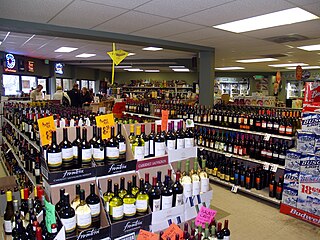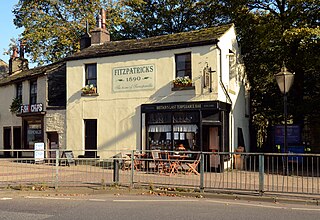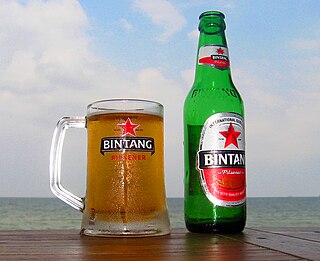
Low-alcohol beer is beer with little or no alcohol by volume that aims to reproduce the taste of beer while eliminating or reducing the inebriating effect, carbohydrates, and calories of regular alcoholic brews. Low-alcohol beers can come in different beer styles such as lagers, stouts, and ales. Low-alcohol beer is also known as light beer, non-alcoholic beer, small beer, small ale, or near-beer.

Prohibition is the act or practice of forbidding something by law; more particularly the term refers to the banning of the manufacture, storage, transportation, sale, possession, and consumption of alcoholic beverages. The word is also used to refer to a period of time during which such bans are enforced.

Drinking culture is the set of traditions, rituals, and social behaviors associated with the consumption of alcoholic beverages. Although alcoholic beverages and social attitudes toward drinking vary around the world, nearly every civilization has independently discovered the processes of brewing beer, fermenting wine, and distilling spirits, among other practices.

A liquor store is a retail business that predominantly sells prepackaged alcoholic beverages, including liquors, wine or beer, usually intended to be consumed off the store's premises. Depending on region and local idiom, they may also be called an off-licence, off-sale, bottle shop, bottle store or, colloquially, bottle-o, liquor store or other similar terms. A very limited number of jurisdictions have an alcohol monopoly. In US states that are alcoholic beverage control (ABC) states, the term ABC store may be used.

Public intoxication, also known as "drunk and disorderly" and "drunk in public", is a summary offense in certain countries related to public cases or displays of drunkenness. Public intoxication laws vary widely by jurisdiction, but usually require an obvious display of intoxicated incompetence or behavior which disrupts public order before the charge is levied.

Alcohol advertising is the promotion of alcoholic beverages by alcohol producers through a variety of media. Along with nicotine advertising, alcohol advertising is one of the most highly regulated forms of marketing. Some or all forms of alcohol advertising are banned in some countries.
An open-container law is a law which regulates or prohibits drinking alcohol in public by limiting the existence of open alcoholic beverage containers in certain areas, as well as the active consumption of alcohol in those areas. "Public places" in this context refers to openly public places such as sidewalks, parks and vehicles. It does not include nominally private spaces which are open to the public, such as bars, restaurants and stadiums.

A temperance bar, also known as an alcohol-free bar, sober bar, or dry bar, is a type of bar that does not serve alcoholic beverages. An alcohol-free bar can be a business establishment or located in a non-business environment or event, such as at a wedding. Alcohol-free bars typically serve non-alcoholic beverages, such as non-alcoholic cocktails known as mocktails, alcohol-free beer or low-alcohol beer, alcohol-free wine, juice, soft drinks and water. Popular temperance drinks include cream soda, dandelion and burdock, sarsaparilla, and Vimto, among others. Various foods may also be served.

Alcohol laws of New York are a set of laws specific to manufacturing, purchasing, serving, selling, and consuming alcohol in the state of New York. Combined with federal and local laws, as well as vendor policies, alcohol laws of New York determine the state's legal drinking age, the driving under the influence limit, liquor license requirements, server training, and more.

A drinking establishment is a business whose primary function is the serving of alcoholic beverages for consumption on the premises. Some establishments may also serve food, or have entertainment, but their main purpose is to serve alcoholic beverages. There are different types of drinking establishment ranging from seedy bars or nightclubs, sometimes termed "dive bars", to 5,000 seat beer halls and elegant places of entertainment for the elite. A public house, informally known as a "pub", is an establishment licensed to serve alcoholic drinks for consumption on the premises in countries and regions of British influence. Although the terms are increasingly used to refer to the same thing, there is a difference between pubs, bars, inns, taverns and lounges where alcohol is served commercially. A tavern or pot-house is, loosely, a place of business where people gather to drink alcoholic beverages and, more than likely, also be served food, though not licensed to put up guests. The word derives from the Latin taberna and the Greek ταβέρνα/taverna.

Drinks containing alcohol are typically divided into three classes—beers, wines, and spirits—with alcohol content typically between 3% and 50%. Drinks with less than 0.5% are sometimes considered non-alcoholic.

The state laws governing alcoholic beverages in New Jersey are among the most complex in the United States, with many peculiarities not found in other states' laws. They provide for 29 distinct liquor licenses granted to manufacturers, wholesalers, retailers, and for the public warehousing and transport of alcoholic drinks. General authority for the statutory and regulatory control of alcoholic drinks rests with the state government, particularly the Division of Alcoholic Beverage Control overseen by the state's Attorney General.
Alcohol laws of Australia are laws that regulate the sale and consumption of alcoholic beverages. The legal drinking age is 18 throughout Australia. The minimum age for the purchase of alcoholic products in Australia is 18. A licence is required to produce or sell alcohol.

Alcohol is commonly consumed and available at pubs and liquor stores in Australia – all of which are private enterprises. Spirits can be purchased at liquor stores and pubs, whereas most grocery stores do not sell them, although they may have separate liquor stores on their premises. Alcohol consumption is higher, according to WHO studies, than in most European countries and several Central Asian and African countries, although consumption is just as high in Australia as in North America. After tobacco, alcohol is the second leading preventable cause of death and hospitalisation in Australia.

Alcohol laws are laws relating to manufacture, use, as being under the influence of and sale of alcohol or alcoholic beverages. Common alcoholic beverages include beer, wine, (hard) cider, and distilled spirits. Definition of alcoholic beverage varies internationally, e.g., the United States defines an alcoholic beverage as "any beverage in liquid form which contains not less than one-half of one percent of alcohol by volume". Alcohol laws can restrict those who can produce alcohol, those who can buy it, when one can buy it, labelling and advertising, the types of alcoholic beverage that can be sold, where one can consume it, what activities are prohibited while intoxicated, and where one can buy it. In some cases, laws have even prohibited the use and sale of alcohol entirely.

Sale and consumption of alcoholic liquor for human consumption is prohibited in the states of Bihar, Gujarat, Mizoram, and Nagaland. All other Indian states and union territories permit the sale and consumption of alcohol.

Social customs and laws concerning drinking alcohol in public vary significantly around the world. "Public" in this context refers to outdoor spaces such as roads, walkways, parks, or in a moving vehicle. Drinking in bars, restaurants, stadiums, and other such establishments, for example, is not generally considered to be "in public" even though those establishments are open to the general public.

Alcohol in Indonesia refers to the alcohol industry, alcohol consumption and laws related to alcohol in the South East Asian country of Indonesia. Indonesia is a Muslim majority country, yet it is also a pluralist, democratic and secular nation. These social and demographic conditions led to Islamic parties and pressure groups pushing the government to restrict alcohol consumption and trade, while the government carefully considers the rights of non-Muslims and consenting adults to consume alcohol, and estimates the possible alcohol ban effects on Indonesian tourism and the economy.

The production and consumption of alcoholic beverages, especially wine, in Afghanistan has a long tradition – going back at least to the fourth century BC. Currently, the possession and consumption of alcohol is prohibited for Afghan nationals. However, the Afghan government provided a license for various many outlets to distribute alcoholic beverages to foreign journalists and tourists, and black market alcohol consumption is prevalent as well. Bringing two bottles or two litres of alcoholic beverages was allowed for foreigners entering Afghanistan prior to the Taliban takeover in August 2021.


















